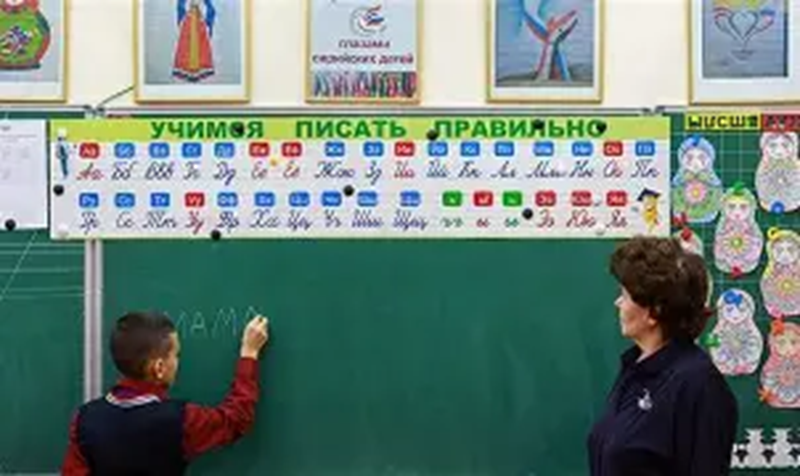Putin's language policy
A new decree signed by the president lists the various forms of use in Russia of words adopted from other languages that the authorities must minimise in the official spoken language. But since its origins, Russian has seen a continuous mixing of terms from European and Asian languages. Starting with the word Rus' itself.
Moscow (AsiaNews) - President Vladimir Putin recently signed a decree on the “Fundamentals of State Language Policy” in Russia, which identifies as threats to the Russian language, the basis of the “exclusive cultural and civilising community of the Russian world”, the various forms of use in Russia of words adopted from other languages, which the authorities must reduce to a minimum in official spoken language.
The Kremlin's state language policy therefore aims to promote the Russian language as ‘Russia's national heritage and one of the foundations of Russian statehood’, a means of communication at the international level in the post-Soviet space, increasing its popularity in other foreign countries as well.
The Duma has passed a law requiring the reduction of foreign words in public communication, defined as “defending the Russian language from excessive use of borrowings from foreign languages”.
This commitment is not easy to achieve, considering that since the origins of Kievan Rus', there has been a continuous mixing of terms from European and Asian languages.
The term “Rus” itself, according to some interpretations, could be a derivative of the Greek name “Rhôs”, which is found in some texts from the centuries when the Eastern Slavic tribes invaded the territories of the Byzantine Empire, in analogy with the “Rossi” and “Barbarossa” names given by the Italic peoples to the Norman and Swabian invaders because of their reddish hair and beards.
Not to mention the Russian dengi, the “money” in the Tatar variant, preserved for example in the Kazakh tenge in memory of the great empire of the descendants of Genghis Khan, or the kozaki-Cossacks of the late Middle Ages, also related to the Kazaks of the Central Asian steppes.
Various comments on Russian social media take a very critical and ironic tone regarding this initiative, such as that of Aleksandr Plokhotenko, who recalls “an old Soviet method of reacting to official communications from above: try to understand the opposite of what they say, because if they say everything is fine, it means everything has gone to hell”.
Many find it paradoxical that the defence of the Russian language and culture is being proposed by those who have “invested so much effort, money and missiles to ensure that everything Russian, starting with language and literature, is seen in a negative light around the world”.
It is clear, according to Aleksey Kopytko, that the promotion of the Russian language is merely a propaganda operation, “a task entrusted to the Minister of Foreign Affairs, the Minister of Education, the Minister of Culture and a hundred other federal bodies with huge investments to spread the ideology of the Russian world”, not only in historically linked countries such as Central Asia, but also in Israel, India, China, Cuba and Egypt, and perhaps even throughout Africa.
In need of acceptable migrant workers, all these countries are strengthening structures such as the Russkij Dom to teach Russian to those they want to attract to work and war, and to avoid having them study directly in Russia.
Another commentator, Anton Belov, points out that according to statistics, “one in ten words commonly used is an Anglicism or a loanword from other languages”, and of the remaining nine, at least five are older influences, with only the ending “ikh” to make them Russian nouns, “a real achievement of the true patriots”, considering that “homeland” in Russian would be “Rodina” or “Otčizna”, from which no term for its supporters is derived.
Andrei Kordočkin proposes replacing the term “prezident” with “zar”, were it not for the fact that the latter also derives from “Caesar”, “c-zar”. And the repressive laws of recent years indicate as the most threatening crimes those of “fejk”, “diskreditatsija”, “inoagent”, “operatsija”, “konstitutsija” and “prostitutsija”, against which the “ministry”, “prokurory”, “generaly” and the “presidenty” themselves are railing, and therefore the “kodeks” and the “magistratura” should simply be abolished, since nothing in this field sounds Russian.
The same “replacement decree” proposes around forty “derived” words to be eliminated, listing the preferred replacements alongside them, starting with prezident, which becomes glava gosudarstva, “head of state”, since “tsar” does not sound very convincing, and “Federatsija” becomes “Federalnyj Soyuz”, which sounds much more acceptable, as it is similar to “Sovetskij Soyuz”, the Soviet Union, which evokes a real nostalgia for the purity of the language and “state ideology”.
27/07/2023 09:57
19/11/2022 09:00
16/08/2021 10:33
09/05/2019 21:07
28/03/2018 17:51







.png)










